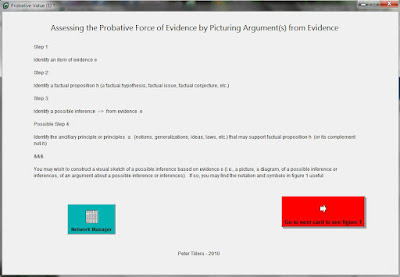It's here: the law of evidence on Spindle Law. See also this post and this post.
Saturday, September 11, 2010
Put the Pieces Together
Assess the Strength of Your Evidence
It's here: the law of evidence on Spindle Law. See also this post and this post.
Gather Your Evidence
It's here: the law of evidence on Spindle Law. See also this post and this post.
Time Lines and Scenarios
It's here: the law of evidence on Spindle Law. See also this post and this post.
Finding the Law
It's here: the law of evidence on Spindle Law. See also this post and this post.
Marshaling Evidence by Law
It's here: the law of evidence on Spindle Law. See also this post and this post.
Various Methods of Marshaling Evidence
It's here: the law of evidence on Spindle Law. See also this post and this post.
Marshaling Evidence
It's here: the law of evidence on Spindle Law. See also this post and this post.
Friday, September 10, 2010
The "Clergy Sex Abuse" Litigation Wars Continue
A judge in West Virginia has dismissed all charges against a Catholic priest from Cincinnati who was accused of molesting a 10-year-old boy in 1991. Attorneys for the priest, who was suspended for over a year because of the allegations, said the ruling found that the accuser had manipulated and falsified evidence.Ashby Jones, Plaintiffs Drop Sex-Abuse Suit Against Vatican Wall Street Journal Online (August 11, 2010):
Lawsuits over alleged sex abuse by Catholic priests aren't new or unusual. But the Kentucky case gained notoriety because it targeted not U.S.-based priests or bishops, but the Vatican itself. According to the allegation, Catholic clergy in the U.S. engaged in a systematic cover-up of sex abuse under explicit instruction from the Holy See. The plaintiffs charged the cover-up led to numerous incidents of sex abuse.Belgian church abuse raids ruled illegal BBC News Europe (9 September 2010):In his filing, Mr. McMurry blamed earlier legal decisions in the case which supported the Vatican's argument that as a sovereign nation it was largely immune from lawsuits.
"Plaintiffs in this case are permitted only to pursue claims against the Holy See for the acts of its 'officials or employees' in the United States," the filing read. "Plaintiffs are without the legal right to pursue the Holy See for its direct acts."
Jeffrey Lena, a lawyer for the Vatican, said in a statement: "Six years ago, the plaintiffs' lawyers concocted a series of allegations. But they never had the evidence to back those allegations up. And that is the real reason plaintiffs now wish to dismiss their own case."
At least three other cases filed in the U.S. are pending against the Vatican. Michael Finnegan, a lawyer for the plaintiffs in those, said the dismissal of the Kentucky case would have "no bearing at all" on them. "We believe in our cases and we're moving forward," he said.
A Belgian court has ruled that recent raids by police investigating alleged child sex abuse by Catholic priests were illegal.The appeals court also said the documents seized in June's raids on several buildings of Belgium's Catholic Church cannot be used by prosecutors.
[snip, snip]
In April, the Church was shaken when the Bishop of Bruges, Roger Vangheluwe, resigned and admitted to having sexually abused a boy before and after becoming a bishop.
[snip, snip]
On Thursday, the appeals court in Brussels said the raids on the Church headquarters north of the capital and at the home of the former Archbishop of Belgium, Cardinal Godfried Danneels, were disproportionate. The court also ordered that all the seized documents - including nearly 500 files and a computer from the offices of a Church commission investigating allegations of sex abuse - must be returned.
The current Archbishop of Belgium, Cardinal Andre-Joseph Leonard, said after the ruling that it was "in everyone's interests that the fundamental rules of law are respected", the AFP news agency reports.
He stressed that he was "in no way opposed to a correctly-run judicial investigation" had that he was "satisfied that clarity has finally been shone on this affair".
The Church commission [which had been set up with the Belgian Catholic Church's cooperation to investigate clergy sex abuse in Belgium] resigned en masse soon after the raids, and Pope Benedict XVI has denounced the raids as "deplorable".
It's here: the law of evidence on Spindle Law. See also this post and this post.
Thursday, September 09, 2010
Neurocharacter
Isn't the common use of the word "circumstantial" in this context unfortunate? (Yes.)
It's here: the law of evidence on Spindle Law. See also this post and this post.
Monday, September 06, 2010
Fact -- or Chauvinism?
Dr. Salmi points to France and Germany, two prosperous countries, both with a long tradition of scientific achievement, yet whose best universities “are hardly recognized as elite institutions.”
It's here: the law of evidence on Spindle Law. See also this post and this post.





















